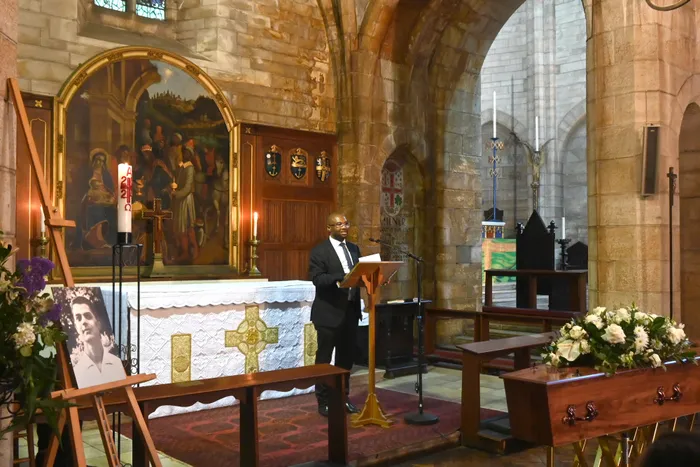Basil February: A life of immense courage and sacrifice

Terry February speaks at the funeral of his brother Basil in Somerset West on October 23, 2024. The mortal remains of Basil February, a member of the ANC’s armed wing Umkhonto weSizwe (MK) who was killed in action in the then Rhodesia on August 16, 1967, was repatriated to South Africa five decades after his death. Photographer: Ayanda Ndamane / Independent Newspapers
Dr. Reneva Fourie
In the intricate and often challenging history of South Africa, Basil February’s life stands out as a poignant example of resilience. His journey is marked by unwavering determination and bravery in the pursuit of liberation, reflecting the strength of those who fought against adversity.
Born on August 8, 1943, February’s journey is a testament to the relentless spirit of those who resisted oppression during apartheid. His story, a blend of academic aspirations and political commitment, provides a profound understanding of the sacrifices made by countless individuals in the quest for our freedom.
Growing up amidst systemic injustice, February was acutely aware of the limitations imposed by an oppressive regime that sought to stifle the dreams of black South Africans. He demonstrated immense potential as a student, first at Trafalgar High School and later at the University of Cape Town, where he initially aimed to study law. However, after his application was denied by the state, he switched his focus to medicine. Yet, the harsh realities of apartheid soon redirected his path towards armed resistance.
In 1964, February, alongside his comrade James April, joined the military wing of the African National Congress (ANC), known as Umkhonto we Sizwe (MK). Adopting the pseudonym Paul Petersen, he embraced the spirit of the liberation struggle while keeping his family roots close to his heart. His journey took him from the familiar streets of Cape Town to Czechoslovakia, where he received military training and honed the skills necessary to navigate the challenging landscape of resistance against colonial and apartheid rule.
In August 1967, shortly after finishing his training, February boldly crossed the Zambezi River into then Rhodesia, taking part in a daring mission approved by ANC President Oliver Tambo. As a senior member and political commissar of the Luthuli Detachment, he played a vital role in the Wankie Campaign, which aimed to carve a pathway for the liberation struggle. Tragically, he met his fate in a shoot-out just days after celebrating his 24th birthday, ultimately being laid to rest in an unmarked grave.
For years, his family grieved in silence, left in the dark about what had truly happened to their beloved Basil. It wasn’t until Zimbabwe gained independence and South Africa began its journey towards democracy in 1994 that hope emerged for retrieving his remains. This shifting political landscape prompted a reassessment of historical narratives and a renewed acknowledgement of the heroes who sacrificed their lives for freedom. His posthumous award of the Mendi Decoration for Bravery Gold in 2003 stands as a tribute to his fearless commitment to justice and equality.
On September 25, the remains of 42 ANC and PAC freedom fighters, who lost their lives in exile in Zimbabwe and Zambia, were finally brought home. Among them was Basil February, along with notable figures such as Duma Nokwe, the ANC’s secretary-general, Florence Mophoshe, head of the ANC Women’s Section, and journalist Todd Matshikiza. This repatriation marked a significant step toward closure and healing for their families and communities.
February was finally laid to rest on October 29 in Somerset West. At his funeral, family members reflected on the profound impact of his life and legacy. His younger brother Terry poignantly captured the essence of Basil’s story, expressing feelings of pride tinged with sadness. Terry’s remembrance highlighted the stark contrast between the current state of the ANC and the revolutionary fervour that once fuelled their struggle, offering a powerful historical perspective. Basil’s candour and dedication left an indelible mark on all who knew him.
Remembering Basil February is not just a tribute to a brave liberation fighter but also an acknowledgement of countless others who fought for justice in South Africa. Their stories remind us of the enduring value of courage and the ongoing need to address the remnants of prejudice and inequality in today’s world. Let Basil February’s legacy serve as a beacon of hope and resilience for future generations, inspiring them to continue the fight for freedom and justice.
* Dr Reneva Fourie is a policy analyst specialising in governance, development and security.
** The views expressed in this article do not necessarily reflect the views of The African.